We all know the “Chosen One” trope that is prevalent though all kinds of literature and media from King Arthur to Buffy the Vampire Slayer, and its mutated dystopian form that divides families and communities, as in Veronica Roth’s Divergent and Margaret Atwood’s The Handmaid’s Tale to produce its hero.
But being the “one girl to save the world” or “the Boy who Lived” isn’t always what it’s cracked up to be. Recently, I’m seeing a number of takes on Chosen Ones that are a little different.
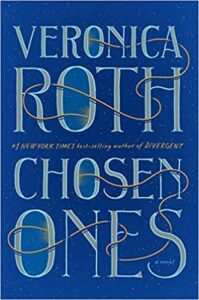 ( Bookshop.org )
( Bookshop.org )
Chosen Ones is Veronica Roth’s newest book, and after her runaway success with Divergent, a series grounded in the “chosen one” trope, it’s interesting to see what she does with it. In it, the government receives a prophecy that could describe any of a number of children. It’s not clear which one is the Chosen One in the prophecy, so all five of the children are trained together to defeat the Evil One. Roth focuses on what happens when the battle is over and the Chosen Ones grow up. Is the battle really over, though?
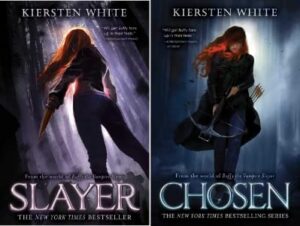 ( Bookshop.org )
( Bookshop.org )
Slayer and Chosen are Kiersten White’s contributions to the Buffyverse. Twins Nina and Artemis live in an Irish castle with what’s left of the Council of Watchers, two months after Buffy shut down all interdimensional portals and destroyed magic, killing off many of the Watchers and potential Slayers, and disappeared. Nina has always felt inferior to Artemis, believing she is only good at being the castle medic, and pretty much everyone around her has shared that belief, but it turns out that she is much more than anyone could have expected.
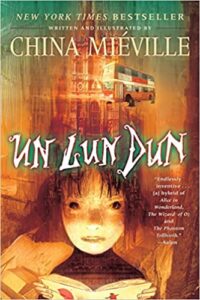 ( Bookshop.org )
( Bookshop.org )
Un Lun Dun by China Mieville is an older title, but one I just encountered myself. It looks like it’s going to be a conventional “Chosen One” story, but plays with the tropes in some surprising ways. Londoners Zanna (the prophesied Chosen One) and her friend Deeba enter UnLondon, a surreal alternate London that gives a new life to the broken and out-of-date things that have been discarded or forgotten by the original Londoners. UnLondon is threatened by a fantastical, sentient version of a very real problem; Smog. Unfortunately for Zanna, the prophecies aren’t exactly right, and Mieville knocks home to the reader that you don’t have to be chosen to save the world. With living words and clothes made from the pages of books, this has a lot in common with The Phantom Tollbooth, but it has some very dark and grim moments among the playfulness, and its urban, underground alternate reality is very reminiscent of Neil Gaiman’s Neverwhere.
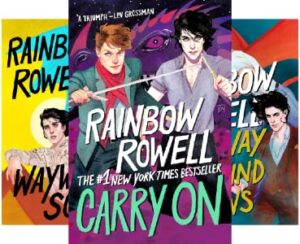 ( Bookshop.org )
( Bookshop.org )
Carry On and Wayward Son are the first two books of a trilogy about Simon Snow (the third, As The Way The Wind Blows, comes out in 2021), the hero of a fictional series created in Rainbow Rowell’s standalone novel Fangirl, where the main character writes fanfic about the series, which itself seems to be loosely based on the Harry Potter books. In Carry On, supposedly the last book in a series of eight, we learn that Simon was told by a Dumbledore-type character that he was chosen to defeat the evil Humdrum. While Simon has his good friend Penelope watching his back, he’s basically no good at magic, his girlfriend has dumped him, he isn’t all that excited about being a Chosen One. Fangirl’s Cath mainly focused on a developing romantic relationship between Simon and his vampire nemesis/roommate Baz, and that is pretty essential to the plot. Wayward Son follows Simon after his final battle with the Humdrum, at a loss of what to do with himself or even communicate with the people who care about him. In an attempt to break him out of this state of mind, Penelope and Baz suggest a road trip across America. It’s kind of an interesting idea to explore “what happens next” in this way, but the lack of communication, especially between Simon and Baz, throughout the majority of the book, drove me bonkers. In both books, Baz is the most interesting and shows the most growth. It is interesting to see Rowell play with and critique the Chosen One tropes while shifting the focus, and the overt LGBTQ+ love story.
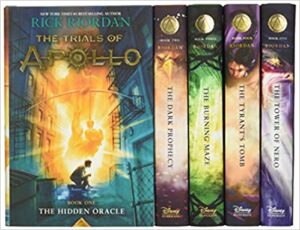 ( Bookshop.org )
( Bookshop.org )
The Trials of Apollo series by Rick Riordan is the most adult of Riordan’s series in the Percy Jackson universe. Beginning with The Hidden Oracle, the fifth and last book in this series, The Tower of Nero, was just released a few months ago. In this series, the arrogant, selfish, handsome Apollo, god of music, prophecy, the sun, and archery is tossed from Olympus by an angry Zeus in the form of a powerless, pimply teenager and forced to serve a sullen tween girl while making up for the harm he has thoughtlessly caused for others, not just in the past but in the present, which turns out to include not just redeeming himself but saving the world. This series has some great LGBTQ+ representation, not just in Apollo but with other characters.
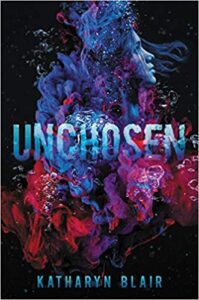 ( Bookshop.org )
( Bookshop.org )
Unchosen by Katharyn Blair, soon to be released, takes place in an apocalyptic dystopian future, where a plague called the Crimson that is spread by eye contact is turning people into ravenous, flesh-eating, intelligent zombies. Charlotte, the narrator, is the unnoticed middle sister to Harlow, who leads a band of survivors, and Vanessa, the Chosen One. Charlotte and Vanessa share a bedroom, and as Vanessa mutters prophecies in her sleep, Charlotte writes them down. When raiders seeking the Chosen One attack their encampment, Charlotte claims to be the Chosen One in order to protect Vanessa.
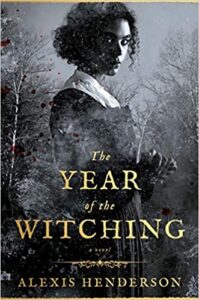 ( Bookshop.org )
( Bookshop.org )
The Year of the Witching by Alexis Henderson has a completely different approach and it is the closest to straight horror on this list. This story takes place in an isolated, patriarchal, oppressive, religious community. The protagonist, Immanuelle, doesn’t know she was chosen for anything special, and doesn’t want to be. She has not been told or even given a choice in the role she will play in the destruction of her community.





Follow Us!